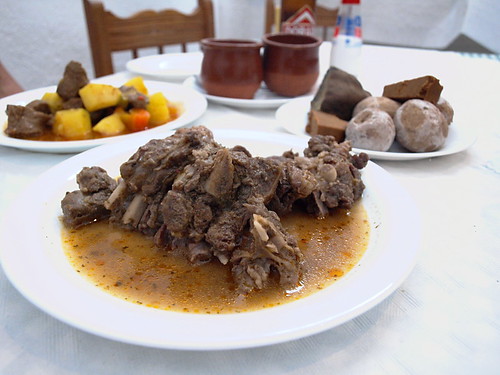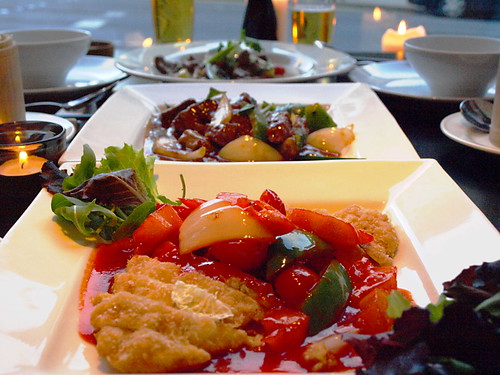We had just recommended a restaurant we had particularly enjoyed to a friend. It turned out she’d already eaten there.
“I thought it very expensive and didn’t think the food was good at all,” was her opposing view.
A couple of days previously another friend had dismissed a popular little restaurant by saying that the menu was limited and, as she didn’t eat meat (fish and vegetarian eater), didn’t have anything for her.
If either had written reviews about the two restaurants in question, neither would have been favourable… and yet their reviews would have been completely unfair.

The first restaurant served very imaginative, quite adventurous cuisine. We’ve eaten out with the friend who didn’t rate the restaurant on a number of occasions… and on every occasion she has eaten the exact same food; a basic lettuce, onion and tomato salad followed by simply grilled fish with potatoes. Every single time. Sophisticated cuisine was never going to ring her bell.
The restaurant in question in the second example was a fish & seafood restaurant which serves one meat dish and that’s chicken. And yet there was nothing on it for our fish eating friend because she doesn’t really eat fish and seafood, she eats prawns. But the restaurant didn’t do prawns, earning it an undeserved thumbs down.

At the other end of the spectrum, we recently stayed in a resort hotel which receives good reviews for its food on TripAdvisor. Our take on the food was that it was inoffensive but totally bland. The hotel mainly catered for mature British visitors who, by the very fact they were half board in a resort hotel, clearly had an undemanding palate. As long as there was decently cooked meat and two veg, they were happy.
The point is that many, many restaurant reviews are written purely from an extremely subjective viewpoint and that negates their value. But how do you identify the ones you can trust? In some ways it’s easier to be able to identify those you can’t.

These are some of the guidelines I apply when deciding whether restaurants reviews are cordon bleu or junk food.
- When a reviewer doesn’t choose fish in a fish, Indian in an Indian or Thai in a Thai restaurant etc. the review is worthless. Anyone who orders spring chicken and chips in a Chinese restaurant just can’t be trusted.
- Read authors’ other restaurant reviews to check what sort of food they tend to opt for. If it’s all of a similar ilk (steak, mixed grills and chicken dishes are a popular haunt of unadventurous diners) their scope is probably too limited to be of value… unless you have similar preferences. But even that’s not a given (see below).
- Reviewers who are habitual steak eaters yet order theirs ‘well done’ are seriously not to be trusted.
- When anyone drops into a review ‘I don’t normally like Indian, Chinese food etc.’ stop reading. Anyone who completely dismisses a nation’s cooking is not a food lover.
- This one isn’t a deal breaker but if a reviewer classes their favourite food as Italian it sets of a little alarm bell for me. I love Italian food but it can be a sanctuary for fussy eaters. Every fussy eater I know will happily opt for an Italian restaurant when faced with culinary options that they feel might be too challenging.
- Treat reviews with caution from anybody at all who writes ‘eeuch’ at the mention of squid, octopus or anything with tentacles.
- Similarly, cast aside the review of all those who don’t like their food to be looking back at them. e.g. insists on fish heads being removed.
- When a review says ‘this is the best steak/Italian/fish’ in a specific location dump the review immediately and challenge them with ‘so you’ve tried every single restaurant there have you?’
- If a review waxes lyrically about how brilliant a restaurant is without any detail about the food, the décor or ambience whatsoever it’s probably an advertorial from someone who has never set foot in the place.
- When the credentials of a restaurant boils down to ‘the locals eat there therefore that’s indisputable proof that it’s good’, proceed carefully. It is one of the most ridiculous statements in travel writing. It makes the assumption that everyone everywhere, apart from the place the author comes from of course, can be trusted as a litmus test for what is good food and what isn’t. Think about it. In the place you live are the busiest places always the best… or just the cheapest?
So how about how to tell if a review can be trusted?
If you’re really into your food, you’ll know. Simple as that.
Jack is co-editor, writer and photographer for BuzzTrips and the Real Tenerife series of travel websites as well as a contributor to online travel sites and travel magazines. Follow Jack on Google+




2 Trackbacks / Pingbacks